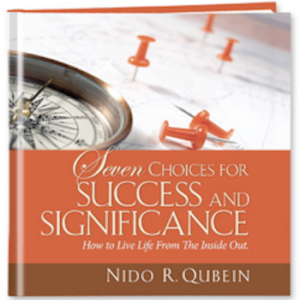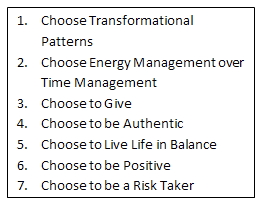I bought this little book — Seven Choices for Success and Significance (How to Live Life From the Inside Out) — when it was recommended to me in 2011. It may be small, but it’s full of power and wisdom from a man who started with nothing and became a huge success.
 The author, Dr. Nido R. Qubein, came to the United States from the Middle East when he was 17, with just $50 to his name and little knowledge of the English language. Today, he is the President of High Point University in North Carolina, and Chairman of the Great Harvest Bread Company, with 225 stores in 43 states. Read his accomplishments here.
The author, Dr. Nido R. Qubein, came to the United States from the Middle East when he was 17, with just $50 to his name and little knowledge of the English language. Today, he is the President of High Point University in North Carolina, and Chairman of the Great Harvest Bread Company, with 225 stores in 43 states. Read his accomplishments here.
Dr. Qubein states that the choices we make determine the person we become, and the seven choices included in this little volume are obvious at first, then become profound in his interpretation.
In the introduction, he speaks of the koi fish – the simple Japanese carp:
“If you put a koi fish in a fishbowl and give it food and water, it never grows to more than two inches in size. But, if you put it in a pond it grows to a foot in size. The koi fish grows proportionately to the environment in which it lives. So must we, if we are to succeed and live a life of significance.”
The Choices

I’ll speak here of the first two choices:
#1: Choose Transformational Patterns, and 2#: Choose Energy Management over Time Management.
Transformational choices, Dr. Qubein states, are those that change the direction of our lives, and put us on a path to success and significance. “The people I admire most don’t live their lives by a ‘TO-DO’ list,” he says, “They live their lives by a ‘TO-BE’ list.” To be more generous, more patient, more learned, more reasoned.
Choosing energy management over time management: If you focus on time, Dr. Qubein says, you can be held back by transactional things. “I think in terms of energy,” he states. “Is this activity worthy of my energy?” We are like batteries; we all have 24 hours each day, but if we fizzle out after five hours, the other 19 don’t matter.
Focus, Dr. Qubein says, on activities that contribute to the greatest value in your life and do more of them.
The final point Dr. Qubein makes is this: Success is secular. Significance is spiritual. Success focuses on tasks and goals. Significance focuses on purpose.
What choices will you make today?